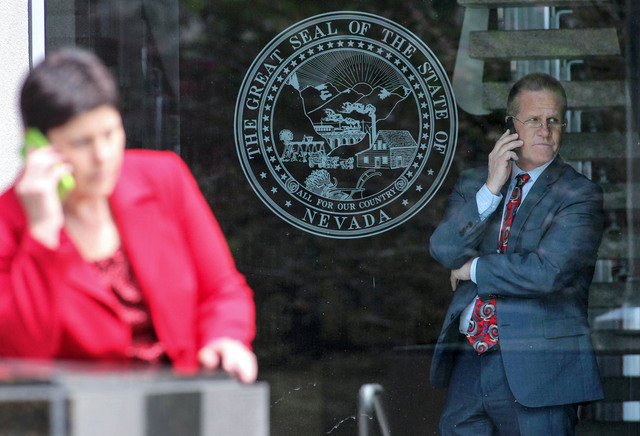Hot issues remain as Nevada Legislature enters its final week
CARSON CITY — Time is running out for Nevada lawmakers. With adjournment one week away, they must confront and resolve the biggest issues that have been percolating all session.
Topping the to-do list is Gov. Brian Sandoval’s proposed tax package to fund his ambitious education agenda.
Also on the list — a new $15 million initiative introduced late Friday to boost teacher hiring; parental notification before girls undergo an abortion; and yes, a resurrection of a controversial “campus carry” proposal allowing concealed-weapon permit holders to pack heat on college campuses.
With tempers frayed and patience wearing thin, drama — already displayed this session — is likely in the final days.
Legislative money committees have already closed budgets totaling about $7.2 billion for the upcoming two-year budget cycle. Three main budget bills will be introduced by Wednesday, but there could be add-ons. Late Friday, Senate Bill 511 was introduced in the Senate. It is a $15 million initiative backed by Sandoval and legislative leaders to provide scholarships and hiring bonuses for teachers to address the state’s teacher shortage. Clark County school officials said they need to hire 2,600 teachers for the upcoming school year.
Senate Majority Leader Michael Roberson said the Senate will consider the bill, possibly Tuesday or Wednesday, as a full committee.
After the independent Economic Forum earlier this month projected Nevada can expect about $6.1 billion in revenue under existing tax law, the scramble is on to plug a $1.1 billion hole.
Sandoval was forced to come up with a Plan B — called the Nevada Revenue Plan — after his initial tax proposal tying business license fees to industry type and gross revenue hit a bog in the Assembly.
But his new plan — a blend of business license fee hikes, higher modified business taxes assessed on payroll, and a commerce tax on big businesses with annual revenue of $3.5 million or more — is causing heartburn for some lawmakers.
Administration officials Thursday said the new plan will capture revenue that many big players have escaped because they don’t have employees in state. The bill, in total, would raise an estimated $262 million annually.
SENATE BILL 81
The controversial SB 81 is not scheduled to be discussed this week, and remains in the Senate Finance Committee.
The bill is asking to expand the power of the state’s water authority to govern and manage groundwater shortages in areas suffering from severe drought. The bill was first heard by the Senate Government Affairs committee on Feb. 12, then by the Assembly Government Affairs on April 22, but no further action has been taken.
With the Legislature scheduled to adjourn by the end of business Monday, time is running out for Senate Finance to add it to a meeting schedule, leading to the increasing possibility SB 81 could die in committee.
The Nye County Commission failed to pass a resolution to draft a letter in support of the bill at its meeting May 20.
State Water Engineer Jason King has pushed the bill because of Pahrump and other rural areas suffering from extreme drought which the state argues is causing declining groundwater levels in the basin.
Republican state Sen. Pete Goicoechea said the bill is critically important for parts of rural Nevada that have come to largely depend on groundwater.
Opponents said the bill would take away existing water rights, including giving the state engineer control over domestic wells.
TAXES: SUNSETS, ABATEMENTS
A bill to make permanent temporary taxes once slated to expire four years ago is also in play. Senate Bill 483, the so-called “sunset” bill, would enshrine a 0.35 percent increase in the statewide sales tax rate with other levies. It also would boost the tax on a pack of cigarettes to $1.80 from 80 cents. That component also is expected to add $348 million to state coffers over the biennium.
The Senate approved the sunset bill 18-3. It is now lingering in the Assembly, where the Taxation Committee planned to hear it Tuesday.
Efforts also are still underway to simplify Nevada’s live entertainment tax, a nightmare of loopholes, exemptions and arcane requirements that many say is long overdue for a makeover.
On the flip side of raising taxes are bills dealing with tax abatements, a key tool in Sandoval’s economic development arsenal. Still on the table are bills to give tax abatements for huge data centers like Switch, the largest data center in Nevada.
Sandoval in his State of the State address in January announced Switch plans a $1 billion expansion of its Las Vegas facility and a new $1 billion center east of Reno.
The bill passed the Senate unanimously and was approved by the Assembly Taxation Committee, but it is still awaiting a vote by the full Assembly.
Tax abatements for the aviation industry, too, are up in the air. Senate Bill 93 would authorize partial abatements on personal property and sales taxes to companies that own, operate, manufacture, service, test or assemble aircraft or aircraft components.
That measure passed the Senate but has sputtered in the Assembly, where a committee on Friday heard a similar measure, Assembly Bill 161. That bill would require companies to invest at least $250,000 in the state and retain $5 million in personal property in the state to qualify for tax breaks.
Economic development officials say that Nevada is one of only five states in the contiguous United States that does not offer aviation tax incentives and that authorizing tax breaks will result in almost immediate economic activity.
“Parts can be exceptionally expensive,” said Steve Hill, executive director of the Governor’s Office of Economic Development. “This is enough to completely in and of itself drive decisions of airplane owners.”
Then there is the issue of Nevada’s presidential caucus. Senate Bill 421 would scrap the caucus system disdained by Republicans and replace it with a secret-ballot presidential primary to be held in February. But the bill would change the primary for state election contests from June to February — a move that could bring the wrath of voters forced to endure a long election cycle commencing before the previous year’s holiday season.
SB421 was approved by the Senate on a party-line 11-9 vote. It was heard in an Assembly committee, where efforts are underway to amend it by having two primaries — one in February for the presidential races only, leaving the primary for state and local races as they are now, on the second Tuesday in June.
Editor Arnold M. Knightly contributed to this report.

















